Oil Bounce Supports Asia Stocks After 'Black Monday'

A sharp bounce in the price of oil Tuesday provided some support to under-pressure stocks in early Asian trade, a day after global equities suffered their biggest losses in more than a decade.
World stock markets had capitulated on what has become known as "Black Monday", with the Dow Jones Index in the US losing more than 2,000 points, and the crash even triggering the emergency break in early trade amid panic selling.
But there was some relief on Tuesday as oil prices jumped around six percent after plunging by a third the previous day, in their worst session since the 1991 Gulf War.
Japan's main Nikkei index opened three percent lower following the dizzying falls on Wall Street but later pared back losses by more than half.
An hour and a half into trade, the Nikkei stood at 19,622.05 points, a loss of 0.4 percent compared to the previous day.
The Nikkei was helped by a sell-off in the yen, which is normally heavily bought during times of market uncertainty. A weaker yen is positive for exporters on the Japanese market and usually boosts their share prices.
The market in Seoul was down 0.4 percent and the ASX in Australia pared losses to around one percent after opening lower by nearly four percent.
In China, where authorities reported the lowest number of fresh coronavirus cases since data started being reported in late January, the benchmark Shanghai Composite Index opened 0.61 percent higher at 2,961.38 points.
The Shenzhen Composite Index, which tracks stocks on China's second exchange, opened 0.63 percent higher, up 11.68 points, at 1,854.34.
Market panic had been driven by uncertainty over the spreading coronavirus but also a spat between Saudi Arabia and Russia over oil production that had battered prices.
Top exporter Saudi Arabia slashed the prices it charges customers following a bust-up with Russia over crude production cuts, starting a price war that sent traders into a tailspin.
Stephen Innes, chief market strategist at AxiCorp, described Monday's market reaction as the "sum of all fears" and warned the panic had not stopped yet amid "growing evidence that an oil shock of historic proportions is now underway."
"Severe weakness in energy markets is quickly cascading into broader declines in commodity markets, high-yield credit, and equities," he said.
The panic on Monday was felt around the world, with the Dax blue-chip index in Frankfurt seeing its sharpest single fall since 2001.
London's FTSE index closed down more than seven percent while in Paris, the CAC-40 index lost over eight percent, its worst daily drop since the 2008 financial crisis.
"The markets have passed from panic mode into pure hysteria," said Ayush Ansal, chief investment officer at trading firm Crimson Black Capital.
"Markets were at breaking point before Saudi Arabia's decision to launch an oil price war but this latest development has taken them beyond that."
© Copyright AFP 2024. All rights reserved.





















